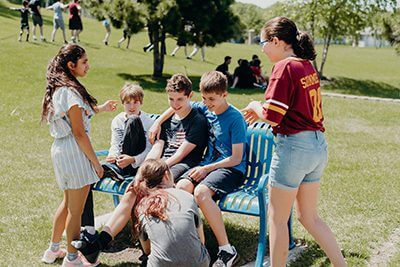September 20, 2019
 Gaining the Skills to Build Healthy Relationships
Gaining the Skills to Build Healthy Relationships
One of our most basic human needs is forming community by making friends. We’re social creatures, drawn to seek connections throughout our lives. While rewarding and fulfilling, building healthy friendships takes practice. It’s an important life skill for children to learn early—increasing their capacity to create friendships, be a good friend, and progressively cultivate and sustain strong relationships at all ages.
Open Discussions on Friendship
“The foundation of friendship is open communication, both in terms of among friends and about friendship itself,” explains Tara Keegan, Mounds Park Academy Lower School counselor. A licensed professional clinical counselor and parent, Keegan recommends beginning conversations about friends starting in PreK. “Ask your child who they sat with at lunch, who they played with at recess, what the group did that day,” she says. “Talk about the feelings around those interactions, and share how important it is to listen and learn within a friendship. That’s the beginning of empathy, being able to understand where another person is coming from, and is so important in building connections and friendships.”
Keegan emphasizes that all children are different, with some enjoying a broad range of friendships, and others more comfortable with a smaller group of friends. “There’s not a right-or-wrong number of friends,” she says. “What’s key is that children are social, are making connections, and continue to build their interpersonal skills in the way that’s right for them.”
Behavioral health specialist Kristen Eastman of The Cleveland Clinic underscores that theme, advising parents to learn more about their child’s approach to forming friendships through a “fly on the wall” approach. She suggests attending school or other activities to casually observe how your child interacts with others, where they stand back and where they join in, and then informally assess their comfort level and skills are when it comes to friendships. With that as a starting point, you can begin talking with your child about friendship, create a safe space to bring forward any worries or concerns, and discuss how they can build supportive relationships.

Navigating Middle School Friendships
Middle School creates a whole new arena for relationships, with students facing more complex interpersonal dynamics during the start of adolescence. “As parents we tend to worry about conflict within friendships, but conflict can serve as a really essential life skill and relationship ability,” says Keegan. “By navigating conflict in a healthy way, we improve those empathy and listening skills, diffuse some emotional intensity, and demonstrate that friends can sustain the inevitable ups and downs of daily life and of growing up.”
As students progress through Middle and into Upper School, it’s also common for friendships to naturally evolve and change. “That can be a tough one for parents, because we’ve often also become invested in these friendships,” Keegan says. “We’re used to our kids being in a certain group or with certain people, and tend to worry a bit as some relationships fade and others emerge. This is another place where parents should be observant, but not over-involved—ask questions, check in on feelings, raise issues if needed, but allow your child to take lead on building their social circle.”
Building healthy relationships is an ongoing focus in MPA’s whole child curriculum, with resources for both students and parents provided at school throughout the year, and at each division level. Character development themes are woven into classroom learning, facilitated discussions are held around key topics in advisory and health classes, peer leaders help other students navigate difficult conversations, and parents can take part in a series of learning events. One powerful example of students building skills and community occurs in Middle School Friendship Groups, which are held over the course of eight weeks. During lunch, students come together to learn about how to navigate difficult emotions, confidently communicate with others, and build strong friendships—proactively addressing the social, emotional, and mental health challenges that appear developmentally during this time.
Friends in Adolescence, Good Mental Health as Adults
The power of building healthy friendships during the teen years was demonstrated by a study from the University of Virginia published in the journal Child Development. “Our research found that the quality of friendships during adolescence may directly predict aspects of long-term mental and emotional health,” said Rachel K. Narr, Ph.D. candidate in clinical psychology, who led the study. Researchers found that, compared to their peers, by age 25 teens who prioritized close friendships when they were 15 had lower social anxiety, an increased sense of self-worth, and fewer symptoms of depression. The researchers suggest this may be because positive friendships help build affirmation during a stage of life when young people are creating their identify and building self esteem. Close friendships early also help set productive standards for friendships—young people learn what healthy relationships look and feel like, so both model and expect those types of connections as they grow up.
“Friends are important to learning, in the academic, social and individual sense,” says Keegan. “It’s a life-long journey, and one that we’re very supportive of and attentive to here at MPA.”
Learn More about It: Healthy Friendships
- Kids Who Need a Little Help to Make Friends, with guidance from the Child Mind Institute on helping children make connections.
- Parenting perspectives from The Washington Post on friendship and middle school.
- Highlights from the MPA Character Development program, teaching respect and integrity as we prepare students to dream big and do right.
Mounds Park Academy, a PreK-12 private school in Saint Paul, is currently accepting inquiries for the 2020-21 school year. For more information about admission and to schedule your tour, visit moundsparkacademy.org/admission. We look forward to getting to know your family!